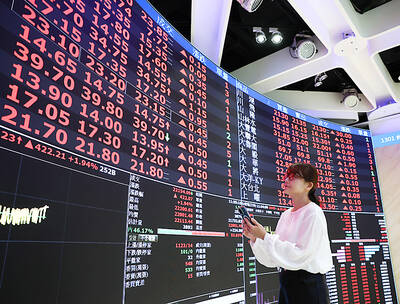Powerchip Semiconductor Corp (力晶半導體), the nation’s top computer memory chipmaker, received initial approval yesterday for a six-month extension on more than NT$63 billion (US$1.82 billion) in syndicated loans from major banks.
Powerchip’s bankers agreed to finalize by the end of this month their internal agreement to give a half-year grace period for the loans, said a Mega International Commercial Bank (兆豐國際商銀) official, who was familiar with the matter but declined to be named.
“In a meeting today [Thursday], Mega gave the go-ahead to the loan rollover. But the initial decision was to ask the board [of directors] for final approval later this month,” the Mega official said by telephone.
Mega lent Powerchip NT$5.93 billion, making it the biggest creditor bank, the official said.
“The approval will help ease the growing pressure [on management] to improve operations during this difficult time when every dynamic random access memory [DRAM] chipmaker is losing cash,” Powerchip spokesman Eric Tan (譚仲民) said by telephone.
The agreement will give Powerchip a half-year grace period for the principal payment on the loans, but its board will be restricted from receiving compensation or bonuses during this period, the Mega official said.
The chipmaker asked the government for help in getting a six-month extension on its bank loans late last year after posting NT$32.03 billion in net losses for the first nine months of the year.
Powerchip was also trying to secure enough funding to avoid defaulting on US$158 million in debt due in June, Tan said.
As of the third quarter of last year, Powerchip had NT$17.6 billion in cash and short-term securities, down from NT$24.7 billion during the same period of 2007.
Meanwhile, DRAM maker, ProMOS Technologies Inc (茂德科技), yesterday said it would buy back US$335 million in corporate bonds currently trading on Singapore Exchange Securities Trading Ltd.
More than 97 percent of investors wanted to excise the put option on the ProMOS bonds due this week, Promos said in a filing to the Taiwan Stock Exchange.
ProMOS would use the NT$3 billion it has secured from its creditor banks to pay the redemption.

UNCERTAINTIES: Exports surged 34.1% and private investment grew 7.03% to outpace expectations in the first half, although US tariffs could stall momentum The Chung-Hua Institution for Economic Research (CIER, 中華經濟研究院) yesterday raised its GDP growth forecast to 3.05 percent this year on a robust first-half performance, but warned that US tariff threats and external uncertainty could stall momentum in the second half of the year. “The first half proved exceptionally strong, allowing room for optimism,” CIER president Lien Hsien-ming (連賢明) said. “But the growth momentum may slow moving forward due to US tariffs.” The tariff threat poses definite downside risks, although the scale of the impact remains unclear given the unpredictability of US President Donald Trump’s policies, Lien said. Despite the headwinds, Taiwan is likely

READY TO BUY: Shortly after Nvidia announced the approval, Chinese firms scrambled to order the H20 GPUs, which the company must send to the US government for approval Nvidia Corp chief executive officer Jensen Huang (黃仁勳) late on Monday said the technology giant has won approval from US President Donald Trump’s administration to sell its advanced H20 graphics processing units (GPUs) used to develop artificial intelligence (AI) to China. The news came in a company blog post late on Monday and Huang also spoke about the coup on China’s state-run China Global Television Network in remarks shown on X. “The US government has assured Nvidia that licenses will be granted, and Nvidia hopes to start deliveries soon,” the post said. “Today, I’m announcing that the US government has approved for us

The National Stabilization Fund (NSF, 國安基金) is to continue supporting local shares, as uncertainties in international politics and the economy could affect Taiwanese industries’ global deployment and corporate profits, as well as affect stock movement and investor confidence, the Ministry of Finance said in a statement yesterday. The NT$500 billion (US$17.1 billion) fund would remain active in the stock market as the US’ tariff measures have not yet been fully finalized, which would drive international capital flows and global supply chain restructuring, the ministry said after the a meeting of the fund’s steering committee. Along with ongoing geopolitical risks and an unfavorable

When Lika Megreladze was a child, life in her native western Georgian region of Guria revolved around tea. Her mother worked for decades as a scientist at the Soviet Union’s Institute of Tea and Subtropical Crops in the village of Anaseuli, Georgia, perfecting cultivation methods for a Georgian tea industry that supplied the bulk of the vast communist state’s brews. “When I was a child, this was only my mum’s workplace. Only later I realized that it was something big,” she said. Now, the institute lies abandoned. Yellowed papers are strewn around its decaying corridors, and a statue of Soviet founder Vladimir Lenin